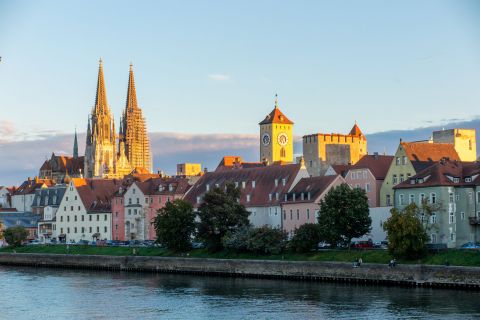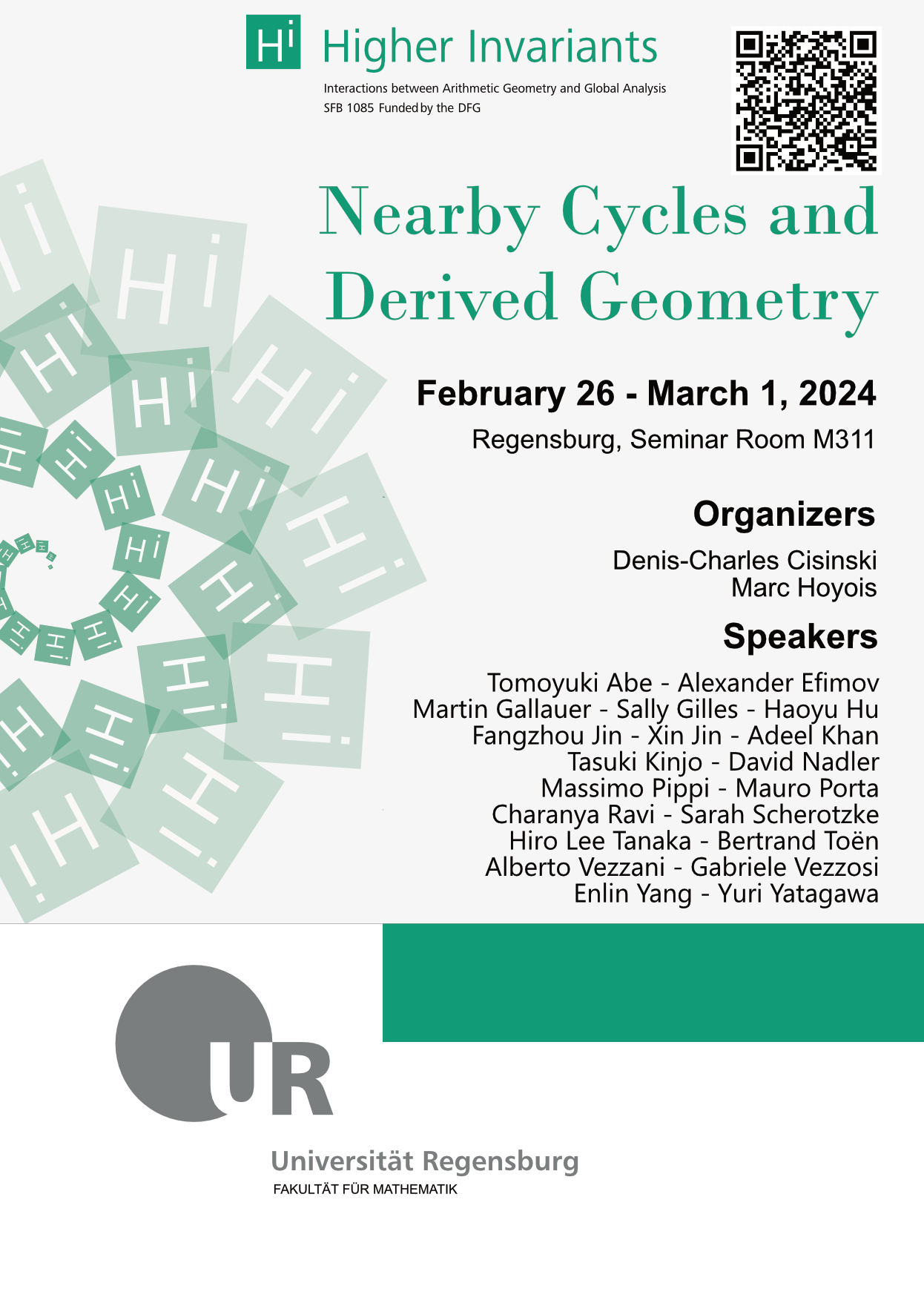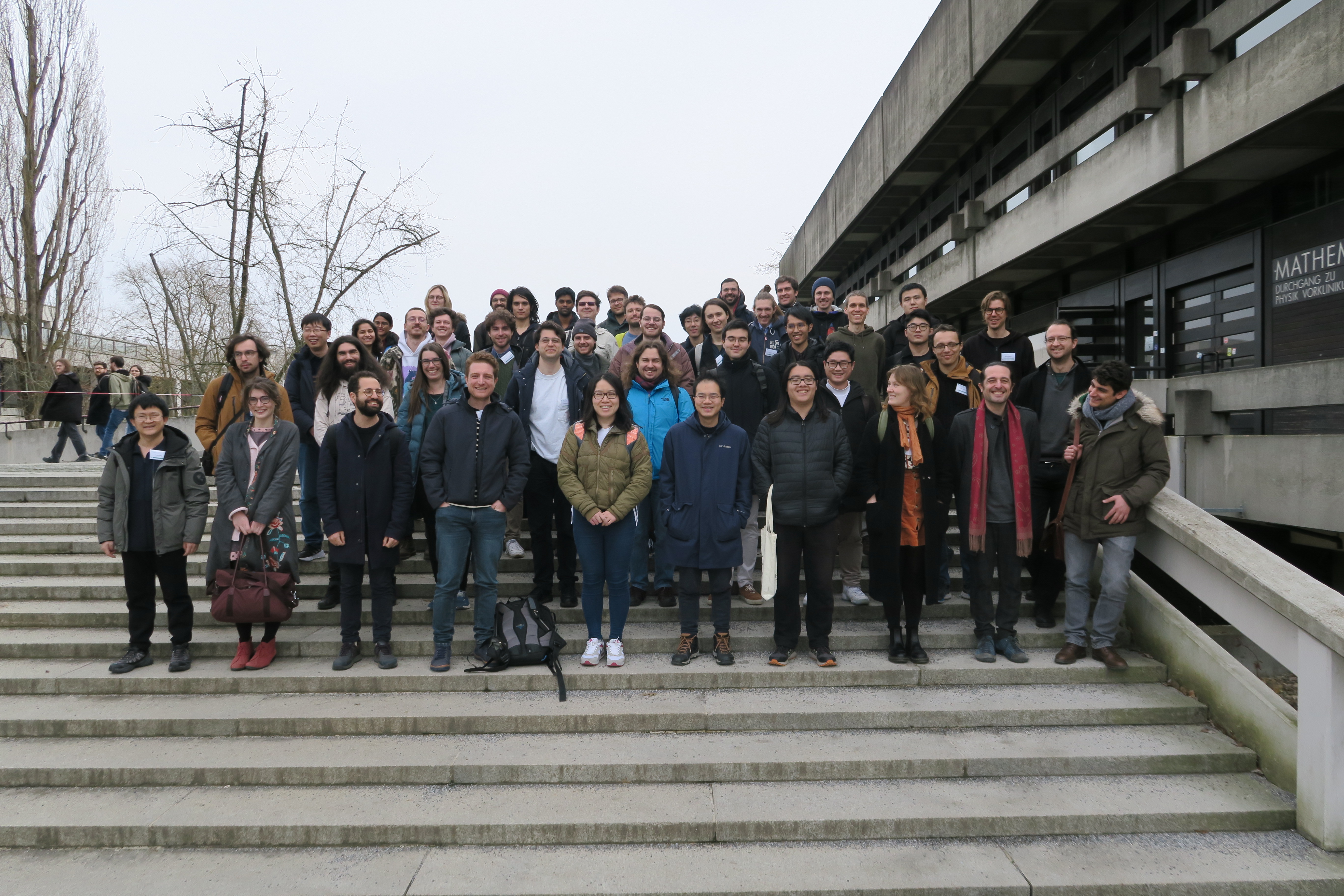

HomeAboutPeopleEventsResearchRTGGuest ProgrammeImpressum
Conference: Nearby Cycles and Derived Geometry (Feb 26 - Mar 1 2024)
Aim and Scope
The geometry of nearby cycles, using microlocal methods or motivic approaches, has recently seen spectacular advances in many different directions: symplectic geometry, non-archimedean analytic geometry, or arithmetic geometry, using more and more tools from derived algebraic geometry and higher category theory. This has many applications in mirror symmetry, in the Langlands program, or in ramification theory, for instance. This conference aims at gathering experts from different fields to emulate progress in different branches of geometry.
List of Speakers
- Tomoyuki Abe
- Alexander Efimov
- Martin Gallauer
- Sally Gilles
- Benjamin Hennion
- Haoyu Hu
- Fangzhou Jin
- Xin Jin
- Tasuki Kinjo
- Massimo Pippi
- Mauro Porta
- Charanya Ravi
- Nicolò Sibilla
- Hiro Lee Tanaka
- Alberto Vezzani
- Enlin Yang
- Yuri Yatagawa
Practical Information
City of Regensburg: Regensburg is a Unesco World Heritage site that is famous for its well-preserved medieval city center and its beautiful Gothic cathedral.
Further information about Regensburg can be found here.
Internet: Access to eduroam and BayernWLAN is available throughout the Mathematics Building.
Accomodation: Regensburg is a tourist destination and we encourage guests to book their rooms as early as possible. Here is a list of hotels in the area:
- Hotel Münchner Hof (In the city center, one must take a bus to the University.)
- Hotel Kaiserhof am Dom (In the city center, one must take a bus to the University.)
- Hotel Jakob (In the city center, one must take a bus to the University.)
- Hotel Apollo (Near the University, but limited eating options nearby.)
- Hotel Wiendl (Between the city center and the University.)
- Hotel Central (Between the city center and the University, one must take a bus to the University.)
Family Friendly Campus: Our UR family service offers various rooms for families and services. If you need further information look here.
Venue
All lectures and research talks are in the lecture hall M311, at the 3rd floor of the Mathematics building of Regensburg University (Attention: not the department "Mathematik und Informatik" of the OTH).
One can reach the University of Regensburg by following the instructions here and see here for maps of the campus. Many of the participants will probably arrive by bus at the Central Bus Station of the university which is close to the math building, a bit more towards North (=top of the plan).
Inside of the Mathematics building, use the staircase next to the main entrance and go up to the top.
Program and Schedule
| Monday February 26 | Tuesday February 27 | Wednesday February 28 | Thursday February 29 | Friday March 1 | |
|---|---|---|---|---|---|
| 9:30 - 10:30 | Hiro Lee Tanaka | Tasuki Kinjo | Alberto Vezzani | Massimo Pippi | Yuri Yatagawa (online talk) |
| 10:30 - 11:00 | Coffee break & Registration | Coffee break | Coffee break | Coffee break | Coffee break |
| 11:00 - 12:00 | Nicolò Sibilla | Mauro Porta | Martin Gallauer | Enlin Yang | Alexander Efimov |
| 12:00 - 14:00 | Lunch | Lunch | Lunch | Lunch | |
| 14:00 - 15:00 | Xin Jin | Sally Gilles | Free afternoon | Tomoyuki Abe | |
| 15:00 - 15:30 | Coffee break | Coffee break | Coffee break | ||
| 15:30 - 16:30 | Charanya Ravi | Benjamin Hennion | Haoyu Hu | ||
| 16:30 - 17:00 | Coffee break | ||||
| 17:00 - 18:00 | Fangzhou Jin |
Hiro Lee Tanaka: Towards an A model over the sphere
Famously, mirror symmetry tells us that certain derived algebraic invariants can be recovered purely through symplectic geometry. And, from the beginnings of this story, it was anticipated that arithmetic (e.g., p-adic) information can both be gleaned from, and help us understand, the physics of mirror symmetry. Much less developed is the story of mirror symmetry over the sphere — both the B model (spectral algebraic geometry) and the A Model (spectral Fukaya categories) are not yet full-fledged. In this talk I'll talk about joint work with Jacob Lurie on constructing a spectrally enriched A model.
Nicolò Sibilla: Elliptic cohomology and mapping stacks
in this talk I will report on work on elliptic cohomology with Tomasini and Scherotzke. With Tomasini we give a new construction of equivariant elliptic cohomology in terms of a stack of maps out of the elliptic curve. This construction generalizes beautiful recent work of Moulinos-Robalo-Toën to the equivariant setting, and brings elliptic cohomology closer to well known constructions in algebraic geometry such as (secondary) Hochschild homology. Also it opens the way to possible non-commutative generalizations. With Scherotzke we show that equivariant elliptic cohomology is not a derived invariant, thus confirming the heuristics that elliptic cohomology captures higher categorical information. This depends on a careful analysis of the equivariant elliptic cohomology of toric varieties.
Xin Jin: Microlocal sheaves in symplectic geometry and mirror symmetry
I will survey some recent progress in microlocal sheaf theory over general coefficients (i.e. ring spectra), and applications in symplectic geometry. I'll then talk about a few more recent results/ongoing projects that calculate certain microlocal sheaf categories (over ordinary rings) arising from mirror symmetry and geometric representation theory, whose generalization over ring spectra should be interesting to explore.
Charanya Ravi: Virtual Grothendieck-Riemann-Roch theorems
We discuss two forms of Grothendieck-Riemann-Roch theorems for derived algebraic stacks. The first one compares lisse extended G-theory with Chow groups and specializes to a higher equivariant Grothendieck-Riemann-Roch theorem. The second one compares G-theory of the stack and Chow group of the inertia stack in the case of derived Deligne-Mumford stacks. As an application, this gives virtual and relative forms Kawasaki-Riemann-Roch formula. This is based on joint projects (in progress) with Adeel Khan.
Tasuki Kinjo: Derived microlocal geometry and virtual invariants
We will introduce a derived geometric generalization of the microlocal sheaf theory, which gives a new perspective on virtual invariants for derived moduli spaces. As an application, we will construct a Hall algebra structure on the cohomological Donaldson-Thomas invariants for the canonical bundle of smooth algebraic surfaces, which gives a 3d refinement of the 2d cohomological Hall algebra due to Kapranov-Vasserot. This talk is based on a forthcoming joint work with Adeel Khan.
Mauro Porta: Homotopy theory of Stokes data and derived moduli
Stokes data are the combinatorial counterpart of irregular meromorphic connections in the Riemann-Hilbert correspondence. In dimension 1, they have been studied by Deligne and Malgrange. In higher dimensions the situation is intrinsically more complicated, but the solution of Sabbah's resolution conjecture by Mochizuki and Kedlaya unlocked a much deeper understanding of the Stokes phenomenon. In recent work with Jean-Baptiste Teyssier, we develop a framework to define and study Stokes data with coefficients in any presentable stable infinity category. As an application, we construct a derived moduli stack parametrizing Stokes data in arbitrary dimensions, extending all previously known representability results. One fundamental input is a finiteness theorem for the stratified homotopy types of algebraic and compact real analytic varieties that we obtained in collaboration with Peter Haine and that extends finiteness theorems for the underlying homotopy types of Lefschetz–Whitehead, Łojasiewicz and Hironaka.
Sally Gilles: Duality in p-adic geometry
I will discuss some duality theorems for p-adic proétale cohomology of analytic spaces. The duality results follow from de Rham dualities after applying a comparison theorem that allows to express proétale cohomology as a filtered Frobenius eigenspace of the de Rham cohomology. This comparison theorem comes from a local computation of the p-adic nearby cycles computing the p-adic proétale cohomology. This is based on a joint work with Pierre Colmez and Wieslawa Niziol.
Benjamin Hennion: Singularity invariants glued on (-1)-shifted symplectic schemes
We will explain how to glueing singularity invariants from local models of moduli spaces endowed with a (-1)-shifted symplectic structure. By studying the moduli of such local models, we will explain how to recover Brav--Bussi--Dupont--Joyce--Szendroi's perverse sheaf categorifying the DT-invariants, as well as a strategy for glueing more evolved singularity invariants, such as matrix factorizations.
Fangzhou Jin: The limit and boundary characteristic classes in Borel-Moore motivic homology
We define limit and boundary characteristic classes in Borel-Moore motivic homology, and compare them with Aluffi's pro-Chern-Schwartz-MacPherson class and Kato-Saito's Swan class respectively. This is a joint work with P. Sun and E. Yang.
Alberto Vezzani: Analytic motives and nearby cycles functors - Part I
We will discuss some recent advances in motivic homotopy theory in the context of p-adic analytic geometry. In this first talk, we give motivic definitions of the Hyodo-Kato cohomology and (relative) rigid cohomology and prove some new finiteness properties for them. We also show how the motivic nearby cycles functor and the motivic monodromy operators simplify the proof of the p-adic weight monodromy conjecture for smooth projective hypersurfaces. This is a survey on some work obtained with F. Binda, V. Ertl, M. Gallauer and H. Kato.
Martin Gallauer: Analytic motives and nearby cycles functors - Part II
We continue discussing recent advances in motivic homotopy theory with a view towards p-adic (analytic) geometry. In this second talk, we show how to lift monodromy operators on nearby cycles to the motivic level. This breaks up naturally into two steps: producing operators at the motivic level, and identifying them under realizations in various cohomology theories. We shall explain both in detail, thereby also justifying the new approach to Hyodo-Kato cohomology described in the first talk. If time permits, we will construct the associated Clemens-Schmid sequence as conjectured by Flach-Morin. This is joint work with J. Ayoub, F. Binda, and A. Vezzani.
Massimo Pippi: Non-commutative nature of l-adic vanishing cycles
The connection between categories of matrix factorizations and vanishing cycles is well known. More recently, A. Blanc, M. Robalo, B. Toën and G. Vezzosi extended this connection also in positive and mixed characteristics. They showed that the l-adic cohomology of the singularity category of the special fiber of a scheme over a dvr coincides with the (homotopy) fixed points with respect to the action of the inertia group of vanishing cohomology. In this talk, I will explain how to recover the whole vanishing cohomology in terms of categories of matrix factorizations. This is joint work with D. Beraldo.
Enlin Yang: Cohomological Milnor formula for constructible etale sheaves
In this talk, we will sketch the construction of non-acyclicity classes for constructible etale sheaves on (not necessarily smooth) varieties, which is defined in a recent joint work with Yigeng Zhao. This cohomological class is supported on the non-locally acyclicity locus. As applications, we show that the Milnor formula and Bloch's conductor formula can be reformulated in terms of the functorial properties of non-acyclicity classes. Based on this formalism, we propose a Milnor type formula for non-isolated singularities.
Tomoyuki Abe: Characteristic cycles of l-adic sheaves and A^1-homotopy
The characteristic cycle of an l-adic sheaf was defined by T. Saito after Beilinson's definition (and existence) of singular support. In the positive characteristic situation, the singular support is defined as a middle dimensional conic closed subset of the cotangent space, but not necessarily be Langrangian. This deficit makes is hard to show the Grothendieck-Riemann-Roch type result for characteristic cycle. In this talk, I will show such a result after inverting the characteristic of the base field using A^1-homotopy theory.
Haoyu Hu: Boundedness of Betti numbers for étale sheaves
The calculation of Betti numbers of étale sheaves has many applications in number theory. In this talk, we discuss a boundedness result for Betti numbers of étale sheaves on smooth schemes with wild ramifications along the boundary. The ramification bound of nearby cycle complexes is involved in the project. This is a joint work with Jean-Baptiste Teyssier.
Yuri Yatagawa: Partially logarithmic characteristic cycles and index formula
We consider a computation in terms of ramification theory for the characteristic cycle of a constructible sheaf on a smooth variety, which is defined by Beilinson-Saito with vanishing cycles. For this purpose, we introduce an algebraic cycle called "partially logarithmic characteristic cycle" for a rank one sheaf using ramification theory as a candidate for computation and discuss the index formula for the candidate and the computation for the characteristic cycle of a rank one sheaf.
Alexander Efimov: Bounded weight structures on dualizable categories
I will explain a natural notion of a bounded weight structure on a dualizable presentable stable category. Important examples include the categories of nuclear solid modules over adic rings, as well as archimedean versions, introduced by Clausen and Scholze.
Given a usual bounded weight structure (in the sense of Bondarko) on a small stable category T, one gets a bounded weight structure on Ind(T) in the new sense. It turns out that for a noetherian I-adically complete commutative ring R, the category Nuc(R) with its natural weight structure can be obtained as a limit of D(R/I^n) in the category of dualizable categories with weight structures.
The key notion is that of a compactly assembled additive infinity-category and its continuous stabilization. I will explain how to define continuous K-theory of compactly assembled additive categories. In the above example my result about the identification of K^cont(Nuc(R)) with lim_n K(R/I^n) can be interpreted as commutation of K-theory with the inverse limit for the sequence (Flat-R/I^n)_n of compactly assembled additive categories of flat modules.
Registration
Pre-Registration: Registration for in-person attendance is closed.
Registration: Registered participants will receive the conference documents on the first day from Birgit Tiefenbach (office in room M301).
Conference Poster
You can download the conference poster here.
Organizers
Denis-Charles Cisinski
Marc Hoyois
Conference Picture
Sponsors of the conference
This conference is funded by SFB 1085 "Higher Invariants"



